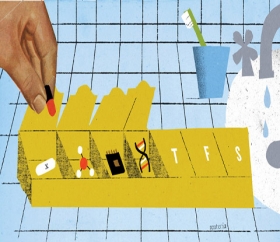Sixth annual Patent Law Colloquium features Aled Edwards, Structural Genomics Consortium co-founder
By Jaime Weinman, JD 2004 / Illustration by Justin Renteria
"I want to ask why we need an IP law,” said Professor Aled Edwards, delivering the keynote speech that closed off the sixth annual University of Toronto Patent Law Colloquium. That’s not something you might normally expect to hear in a law school, but Edwards is the Banbury Chair of Medical Research at the University of Toronto, and he tried to get his audience to imagine a world where medical discoveries are not patented and science professors like himself practice “open science” – which means steering clear of as many IP protections as possible.
After being introduced by the Colloquium’s leader, University of Toronto Law Professor Simon Stern, Edwards quickly took command of the Rosalie Silberman Abella Moot Court room where the event was held in the Jackman Law Building. Edwards gave his keynote some of the qualities of a motivational speech, even ending the presentation with a slide headlined “HOW CAN YOU HELP.”
He argued that patents create a “cloud of IP” that inhibits innovation, while providing little upside; the licensing fees universities get from their patents don’t add up to much, while leading to a bureaucratic nightmare. “You have this network of restrictive agreements passing publicly funded stuff between universities,” he explained. “The University of Toronto, on average, executes about a thousand per year, and each one takes six weeks to execute.” The result, Edwards observed, was that the costs of keeping up patents outweigh the benefits, both financially and in terms of actually helping people.
Edwards preferred the approach taken by his organization, the Structural Genomics Consortium (SGC), a non-profit which he co-founded in 2004 and continues to direct. Open science is part of SGC’s mission, which means, among other things, that patents are not filed, and the research is shared with the public, to make it easier for anyone to build on it or avoid redundancy. Edwards also touted a new startup he co-founded, M4K (Meds For Kids), which aims to use a similar process to help create less expensive treatments for rare childhood cancers.
What does that mean for intellectual property law? It definitely doesn’t mean disclaiming any legal protections. Edwards explained that while M4K will not file patents, “we'll restrict the use of the data for regulatory filings. I'm sure you guys are more expert than I,” he told the audience, “on the ability of regulators to provide data exclusivity. You don't actually need a patent to protect the market.” The idea is that the science will be open, but the marketing rights will be exclusive: other researchers and organizations can do anything "except use our data in a competing regulatory submission."
During the question period, some of the attendees took issue with Edwards’s idea that patents themselves are responsible for the scientific community’s unwillingness to cooperate. One audience member said that his own organization had patented a new method of delivering insulin, but they made it publicly known that anyone could use it for no charge by signing an agreement.
Another questioner challenged Edwards even more directly: “The patents themselves aren't holding you hostage. The fact that some people behave badly –” “Some people?” Edwards replied, incredulously. “Come to my world.” Edwards also argued that the very act of patenting a discovery creates a “trust issue” that dissuades others from using it, and makes it harder for researchers to share what they know.
The idea of sharing was a major theme in the talk, and Edwards was hopeful that open science can reduce competitiveness in his profession. “Professors are like kindergarten children,” he told the crowd. “If Johnny gets more candy than me, that's bad. But if everybody gets the same, we're all right with it.” The picture he painted was optimistic enough that Edwards took a moment to emphasize that he wasn’t being unrealistic: “I’m not a Pollyanna, peace and love tree-hugger,” he said. “It’s actually a more efficient way to get to the answer.” And when addressing a room full of lawyers and law students, it’s probably easier to win them over with an appeal to efficiency than an appeal to peace and love.
The annual Patent Law Colloquium is made possible by a generous gift from Teva Canada

